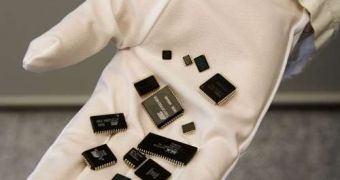If the CPU market has a few players only, the things are completely different with the DRAM manufacturers. This area is a complex environment and each move from any competitor may severely unbalance the whole market. Apart from the competitors' moves, another thing that kills the business is overproduction. The market is under the heavy attack of cheap and extremely abundant RAM modules.
The average price for a 1Gb DDR2 667MHz memory module has encountered a freefall, from about $4.5 in January to $1.6 in late November, according to a report from market tracker DRAMeXchange, while the contract price per chip reduced from $3 in October to $2 in December.
These blockages are caused by PC computer makers who have made huge stocks for the holiday shopping frenzy and keep their high prices. When the market demand decreased so did the prices and the major players in the field, Samsung Electronics and Hynix Semiconductor, experienced a violent bump, since they provide half the memory in the world.
The reversed situation is also available and rumor has it that the DRAM producers are likely to decrease their production in order to stimulate prices. The global memory manufacturers will also continue to keep production under control for the next year, in order to encourage memory appreciation on the market. The Taiwanese DRAM producers have already announced massive cuts in capital expenditures for the next year, while Qimonda decided to cut the European operation about 30 percent down.
"From the market perspective, when prices fall below the variable cost, it becomes highly possible for major DRAM manufacturers to reduce their production volume in spurring prices to rise. Samsung and Hynix in combination own nearly 50% of the global DRAM market, once they or other DRAM makers decide to reduce production, we will then see a chance for DRAM market to reach a balance between supply and demand next year, and potentially a rise in DRAM chip price instead", a statement by DRAMeXchange reads.

 14 DAY TRIAL //
14 DAY TRIAL //